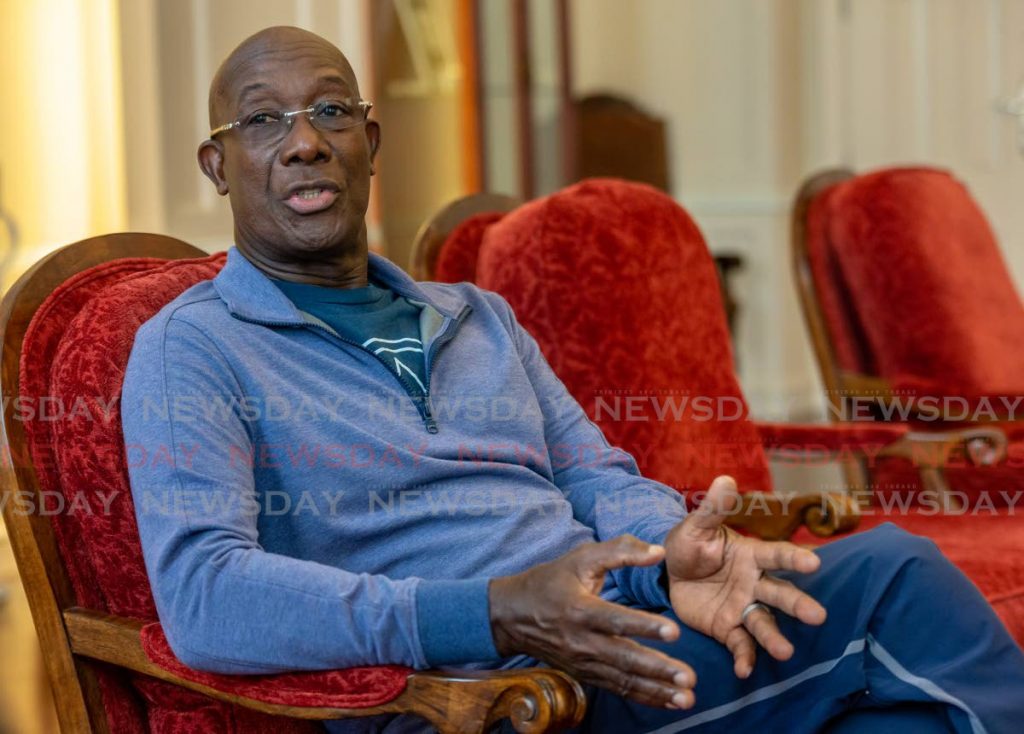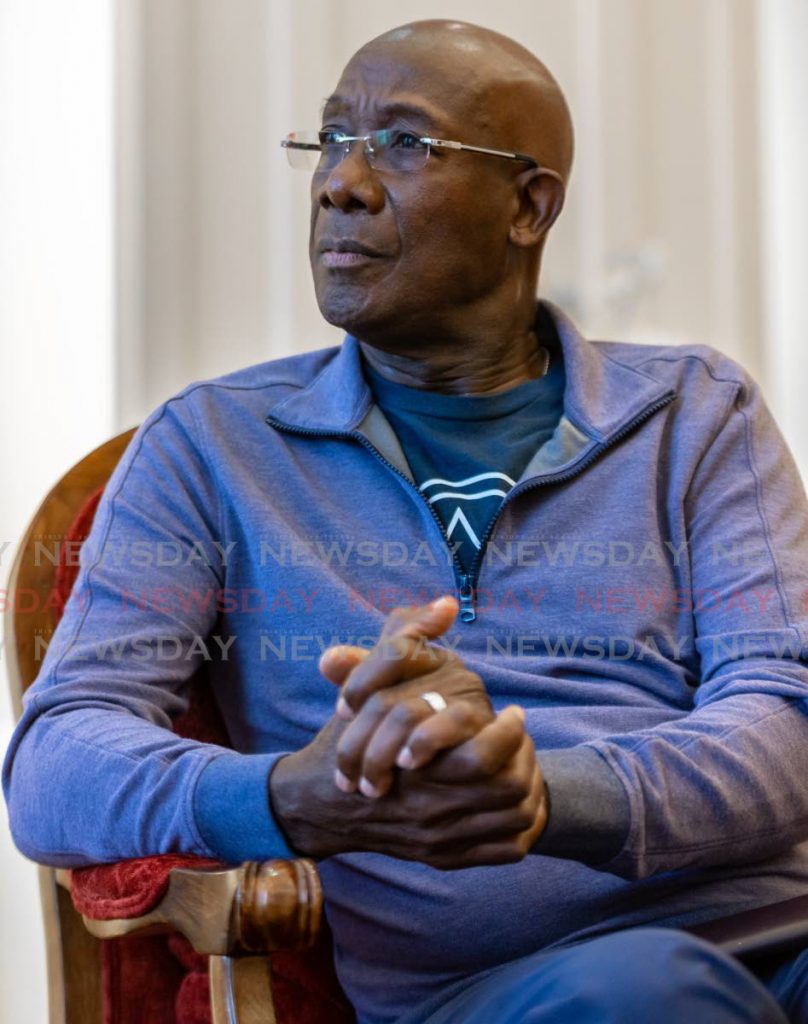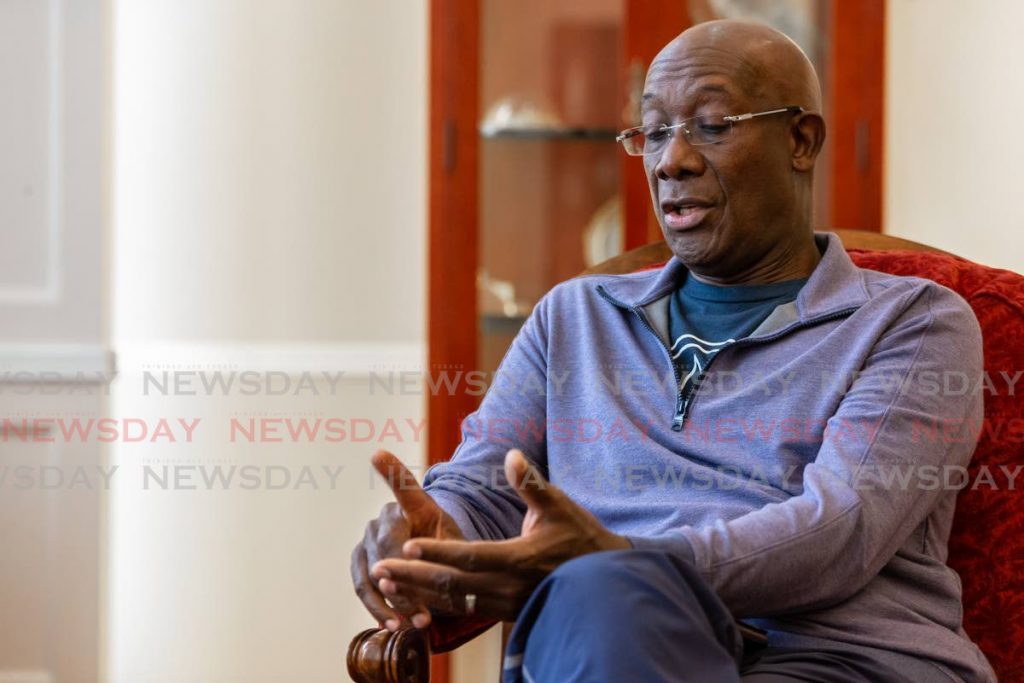PM's push for digitisation, but he has never used an ATM

This is the final part of a conversation with the Prime Minister. Parts one and two were published on December 20 and 21.
FROM November 2003 to November 2007 the Prime Minister was the housing minister. He was the last person in the ministry to be paid by cheque rather than direct deposit, he told Newsday in a one-on-one interview at the Diplomatic Centre, St Ann’s.
“I just like to have my salary cheque at the end of the month. My PS had to come and persuade me not to have the department making a cheque for me. I was accustomed. I work, at the end of the month, please hand me my cheque."
While he uses debit cards, going into a bank and interacting with the tellers has always been part of his routine.
“I go to the bank, take out cash and put it in my wallet. It’s a routine. I enjoy doing that. I like to have money in my wallet. Any time I don’t have money in my wallet when I go out, I need someone to buy something.”
He enjoys taking his cheques to the bank, and if he loses the cheque then that’s on him.
“While I am this advocate for digitisation, I’ve never used an ATM. I always have cash on me…I am of the view that I don’t think I am in full control when I have to trust the system, and I’ve had one or two good examples of this, but I’ll advocate it because it’s where we need to go...
“I know the society is going into a situation of being cashless because of the record-keeping that the technology allows, the interrogation of data, the speed at which data can be managed and the amount of things you can do with available data.”
Rowley acknowledges the analogue and paper-based system of operation in the public sector limits the country.

“The government files are huge tonnes of paper, expensive to obtain, to use and to keep, whereas the digital platforms allow infinite storage.”
The plan to digitise the country, he said, is as wide as it is broad. He intends on TT being part of the digital world without any restrictions.
“Whether we like it or not, because of what the technology allows, we will be drawn in, and the question is how soon, how deeply and how well prepared will we be to participate.”
He believes investing in digitising the country has the potential to improve the society.
“The benefits of accountability, transparency, and speed would far outweigh any of the negative that we want to preserve, and we just have to overcome the resistance and get there.”
Soon, he said, every country in the world would be cashless.
“There was a time when currency was not paper, it was seashells, or it was animal bones, then it was coinage from metal – some of them quite crudely made – then it was fancy coins, then it was paper money. Now, very soon, this item or some replacement of it is going to be where it is all at.”
Some records and files in the Office of the Attorney General have already been digitised and put in a database. Rowley wants to reach the point where every parcel of land in the country is identified and on a database. This, he said, will create an economy that is more efficient.
For those afraid of job loss, Rowley said digitising will create more jobs.
“Once the data is available, you have to use it, and the ability to use it will call for more participation.”
With mass data digitised, hiring data scientists in the public service is now a priority.
People who studied data science abroad and in TT, he said, have the knowledge and ability to provide the kind of guidance to develop the country, and the intention is to make jobs in the public available to them.
“We can’t do that work without them. Their training, we invested in a lot of these people and we need to put them to work in modernising our society.”

Asked about scholarship winners who struggle to get jobs in their field in the public sector, Rowley said, “That is because the society wants to stand in the same place while needing to take part in a race that’s going past you…We are in the race and if we don’t join the race, you can be left behind.”
He said some sectors in the economy are pulling the country into the digital world. The banking sector, for instance, moved ahead with digitising its system before the government. The public healthcare system is in the process of being digitised as well as the legal system.
“We all need to just get on board, and take the whole start forward. Fortunately, we have a pool of young people who can provide the skills we require, but then the wider population has to get on board to benefit from it.”
In the next two to three years, Rowley expects digitised platforms in National Security and other government agencies.
“There’s a lot that’s going on. I think we need to talk more about it…We are digitising the country now. Granted, it’s not just turning a page and it happens, we have to bring it all together in a manageable way.”
In the 2021 budget presentation, Finance Minister Colm Imbert announced there would be a hiring freeze in the public sector. However, Rowley explained that freeze is for the already existing and established posts, not new posts that are yet to be created.
“We are digitising now, and we need people with different skills, but they are not now on the public service establishment.”
However, there are a number of positions the government does not have in order to digitise the country’s database, and those will be filled soon.


Comments
"PM’s push for digitisation, but he has never used an ATM"